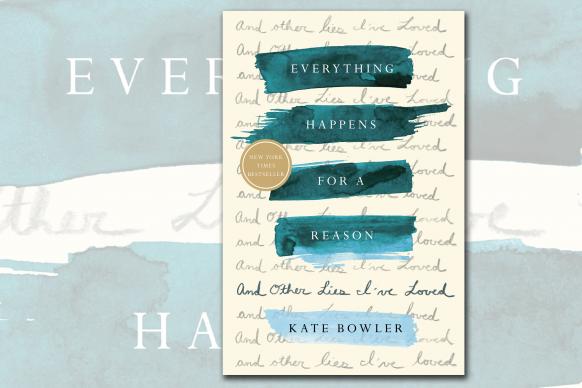A church historian, Kate Bowler spent years studying the American prosperity gospel and wrote a book gently critiquing “the belief that God grants health and wealth to those with the right kind of faith.”
She didn’t call on those beliefs herself to explain her own good fortune, or the fact that she was happily married, with a 2-year-old son, a successful book and a “dream job” as assistant professor of the history of Christianity in North America at Duke Divinity School.
Then, as Bowler puts it, “cancer kicked down the walls” of her life.
In 2015, at age 35, she was diagnosed with stage 4 colon cancer, which is incurable. That’s when she realized that she had herself unknowingly adopted parts of the prosperity gospel — and in face of this devastating news, it didn’t hold up.
Photo of Kate Bowler, courtesy of katebowler.com.
Bowler, a United Methodist, chronicled her faith journey in a book, Everything Happens for A Reason: And Other Lies I’ve Loved (February 2018, Random House). She has shared her story in appearances on Good Morning America, The Today Show and NPR. A column in The New York Times sparked thousands of letters and emails. Her podcast, “Everything Happens with Kate Bowler,” became one of the most popular in the nation overnight.
As she wrote in the book’s opening, “I believed that God had a worthy plan for my life in which every setback would also be a step forward. I believed God would make a way. I don’t believe that any more.” Getting cancer took apart any notions “that life was what I could make it, that what God loves most about me is my hard work and determination.”
Her faith remains strong. But it’s not the same.
“The big revelation for me was that, in the hospital, I felt so broken, yet it somehow felt like it also opened up the world to me,” she said. “I felt the intense love of God at a time when I should have felt abandoned.”
Many people have tried to comfort Bowler with well-meaning platitudes or with explanations: God gave her cancer because she had sinned, or God allowed her to be stricken so that her story could inspire others. In the book, she skewers these with humor and hard-won insights.
“If cancer or divorce or tragedies of all kinds don’t kill you, people’s good intentions will,” she said. “Other than having cancer, the worst part was feeling like I was a theological problem to be solved. That’s how people approach people who are suffering. I’ve had thousands of explanations for my illness sent my way.”
The book’s appendix lists what not to say to people who are experiencing terrible times: Don’t minimize (“Well, at least …”), don’t bestow life lessons (“In my long life, I’ve learned …”), and don’t push alternative “cures” (“I’ve done some research and …”).
And when someone passes away, please don’t say, “God needed an angel.”
Instead, Bowler urges: Bring a meal or a gift. Pledge your support. Offer a hug. Express empathy (“Oh, my friend, that sounds so hard.”). Or simply be present — “Show up and shut up,” as she puts it.
She hopes the book “will make the world a little gentler, a little less ready to weaponize certainties.” If there’s one thing she’d like readers to take away, it’s that “everyone simmers down with the explanations for other people’s suffering, and just steps in with love.”
Bowler grew up among Mennonites in Canada but jokes that she “joined Team Methodist” when she came to Duke. After her diagnosis, support from fellow church and faculty members sustained her and possibly even saved her life. So many showed up to visit in the hospital with clerical collars that hospital security accused her of abusing her chaplaincy privileges. Colleagues connected her with doctors who helped her find and enroll in a clinical trial for an immunotherapy. So far, it has kept the cancer at bay.
“Being sick in the middle of Methodist pastors has been the best part of my experience,” she said. “Methodists are great at tolerating theological ambiguity, and that’s what you need in a moment like mine. You need people to surround you and to be the hands and feet of Christ.”
Bowler’s struggles have rallied the Divinity School community, according to retired Bishop Will Willimon, professor of the practice of Christian ministry at Duke Divinity School. He has seen colleagues who don’t usually get along bond in waiting rooms while Bowler underwent surgery.
“This has been a time of self-examination for many of us, a time to ponder, ‘Do I have the faith to go through something like this with the same amount of truthfulness mixed with humor?’” Willimon said.
“Kate has brought people in the school together,” said Curtis Freeman, research professor of theology at Duke Divinity. “She has been the one who made us laugh and who has called us to the deeper things that we are about.”
Bowler’s book has touched so many people so deeply, inside and beyond the walls of the church, that Willimon calls it “evangelistic” in the best sense of the word.
“She’s giving a public witness,” he said. “We’re getting to watch a very committed Christian go through a serious, life-threatening illness with humor, grace, candor and honesty.”
Jacobs is a freelance writer living in Plano, Texas.
News media contact: Vicki Brown, Nashville, Tennessee, (615) 742-5470 or newsdesk@umcom.org. To get more United Methodist news, subscribe to the free Daily or Weekly Digests
Like what you're reading? Support the ministry of UM News! Your support ensures the latest denominational news, dynamic stories and informative articles will continue to connect our global community. Make a tax-deductible donation at ResourceUMC.org/GiveUMCom.


